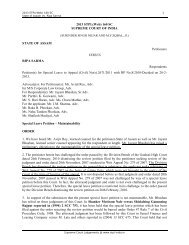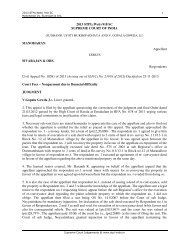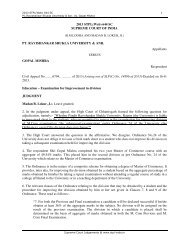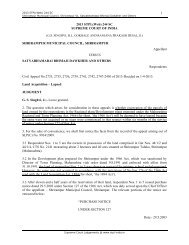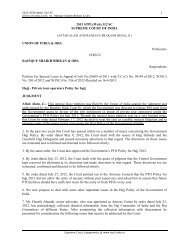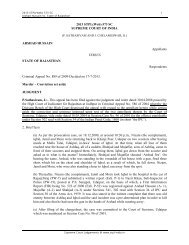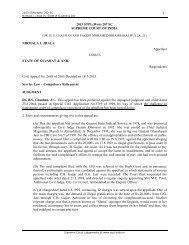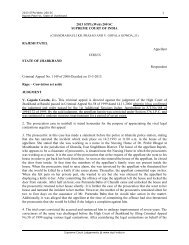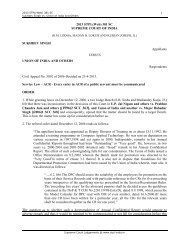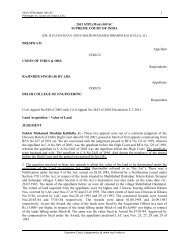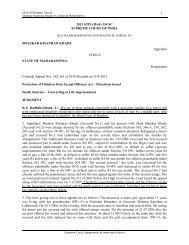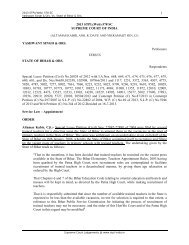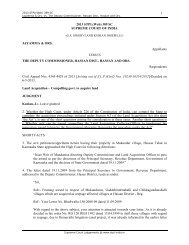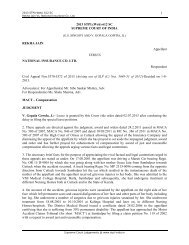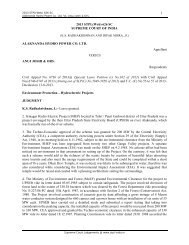Common Cause (A Regd. Society) Vs. Union of India - STPL ...
Common Cause (A Regd. Society) Vs. Union of India - STPL ...
Common Cause (A Regd. Society) Vs. Union of India - STPL ...
Create successful ePaper yourself
Turn your PDF publications into a flip-book with our unique Google optimized e-Paper software.
2010 <strong>STPL</strong>(Web) 636 SC 4<br />
<strong>Common</strong> <strong>Cause</strong> (A <strong>Regd</strong>. <strong>Society</strong>) <strong>Vs</strong>. <strong>Union</strong> <strong>of</strong> <strong>India</strong><br />
respondents are trying to reduce the number and amount <strong>of</strong> NPAs and to detect and check bank<br />
frauds in future.<br />
9. According to Mr. Prashant Bhushan, however, these legislative and administrative measures<br />
taken by the <strong>Union</strong> Government have not been effective in reducing and controlling the NPAs.<br />
Whether legislative and administrative measures taken by the <strong>Union</strong> Government have been<br />
effective or not is not for the Court but for the <strong>Union</strong> Government and Parliament to consider<br />
because reduction and control <strong>of</strong> NPAs are not within the domain <strong>of</strong> judiciary but within the<br />
domain <strong>of</strong> the Executive and Legislature under our Constitution. Moreover, as has been observed<br />
by P.N. Bhagwati, J. in State <strong>of</strong> M.P. and Others v. Nandlal Jaiswal and Others [(1986) 4<br />
SCC 566] in field <strong>of</strong> economic activities, there has to be judicial deference to Legislative and<br />
Executive judgment and decisions on complex economic matters are to be based on<br />
experimentation or what one may call `trial and error method'. It is therefore not for Courts to sit<br />
in judgment whether a particular policy decision <strong>of</strong> the Government is effective or not, but for<br />
Parliament to debate and decide on the policy decision. In a recent decision <strong>of</strong> this Court in<br />
Villianur Iyarkkai Padukappu Maiyam v. <strong>Union</strong> <strong>of</strong> <strong>India</strong> and Others [(2009) 7 SCC 561],<br />
Panchal, J. writing the judgment on behalf <strong>of</strong> a three- Judge Bench observed:<br />
"It is neither within the domain <strong>of</strong> the courts nor the scope <strong>of</strong> judicial review to embark<br />
upon an enquiry as to whether a particular public policy is wise or whether better public<br />
policy can be evolved. Nor are the courts inclined to strike down a policy at the behest <strong>of</strong><br />
a petitioner merely because it has been urged that a different policy would have been<br />
fairer or wiser or more scientific or more logical. Wisdom and advisability <strong>of</strong> economic<br />
policy are ordinarily not amenable to judicial review. In matters relating to economic<br />
issues the Government has, while taking a decision, right to "trial and error" as long as<br />
both trial and error are bona fide and within the limits <strong>of</strong> the authority. For testing the<br />
correctness <strong>of</strong> a policy, the appropriate forum is Parliament and not the courts."<br />
10. The <strong>Union</strong> Government, however, must ensure that SFIO is effective in detecting and<br />
preventing bank frauds by influential people. We find that the Central Government has<br />
constituted a Committee <strong>of</strong> Experts under the Chairmanship <strong>of</strong> Shri Vepa Kamesam, Ex-Deputy<br />
Governor <strong>of</strong> Reserve Bank <strong>of</strong> <strong>India</strong>, with the following terms <strong>of</strong> reference: (a) Assessment <strong>of</strong> the<br />
need for and details <strong>of</strong> a separate stature to govern the constitution and functioning <strong>of</strong> SFIO; (b)<br />
The nature and details <strong>of</strong> the legislative changes as may be required in existing laws, to enable<br />
effective functioning <strong>of</strong> SFIO including prosecution <strong>of</strong> <strong>of</strong>fences detected by it; (c) The<br />
mechanism for referral <strong>of</strong> cases to SFIO and coordination <strong>of</strong> activities <strong>of</strong> SFIO with other<br />
agencies/organizations <strong>of</strong> the Central and State Governments, including investigating; (d) Powers<br />
<strong>of</strong> SFIO and its investigation <strong>of</strong>ficers; (e) Specification <strong>of</strong> <strong>of</strong>fences and penalties to enable<br />
effective conduct <strong>of</strong> investigation agencies and the need for Special Courts for trial <strong>of</strong> corporate<br />
fraud cases; and (f) Other matters consequential to or in pursuance <strong>of</strong> the above. We have no<br />
doubt that this Committee <strong>of</strong> Experts under the Chairmanship <strong>of</strong> Ex-Deputy Governor <strong>of</strong> Reserve<br />
Bank <strong>of</strong> <strong>India</strong> will suggest effective measures, legislative or administrative, to ensure that bank<br />
frauds are prevented in future and the NPAs are kept to the minimum. We hope and trust that this<br />
Committee under the Chairmanship <strong>of</strong> Ex-Deputy Governor <strong>of</strong> Reserve Bank <strong>of</strong> <strong>India</strong> will<br />
consider the suggestion to make the SFIO (or any similar body) a statutory authority having<br />
sufficient powers and having the required autonomy to be able to effectively deal with the<br />
problems <strong>of</strong> bank frauds and NPAs. A copy <strong>of</strong> this order will be placed by the respondent No.1<br />
before the Committee <strong>of</strong> Experts.<br />
11. The writ petition and the application for impleadment/ intervention stand disposed <strong>of</strong>. No<br />
costs.<br />
Supreme Court Judgements @ www.stpl-india.in



